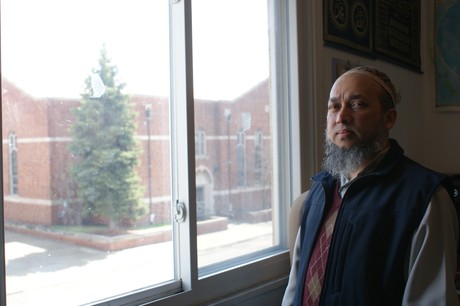Islamic Call To Prayer Sounding Sweeter In Hamtramck

By tradition, the Islamic call to prayer occurs five times each day.
But in the past year Carol Marsh, a Hamtramck Senior Plaza resident, says the call broadcasted over loudspeakers from the Ideal Islamic Center directly across the street from her building has become a literal headache for some elderly citizens.
“When it first opened up it was gonna be an activity center for the Arabic youth,” says Marsh. “No problem with me. Then all of a sudden one Friday we couldn’t figure out where it was coming from but the loudness. We were looking up like we were looking for flying saucers.”
Only mosques are supposed to broadcast the call to prayer, not youth centers.
But Hamtramck zoning officials allowed the Ideal Islamic center to conduct religious practices as well as train youngsters. And Marsh says the youth have added an extra twist to the Call to prayer.
“And now they got a youngster on there doing the call to prayer a couple times a day,” Marsh says. “And he starts with ‘Hellooo! Wake up!’ And it’s in the afternoon when a lot of the senior citizens are taking their naps.”
Hamtramck set limits on how loud the prayer could be broadcast.
But an independent reading of the Ideal Islamic Center’s latest broadcasts falls within the acceptable decibel limits.
Yet the ambiguity over just how loud the call to prayer should be – or actually is – has been just one of several strange twists in the process of allowing the broadcasts.
Hamtramck’s noise ordinance was adjusted to cover the call to prayer in 2004 and city voters also approved a ballot referendum allowing the broadcasts.
Yet instead of reporting any violations to the police, as is the case with other aspects of the noise ordinance, complaints about the call to prayer go directly to Hamtramck’s city clerk who forwards them to the city council – making them as much an immediate political issue as an enforcement dilemma.
That puts Hamtramck Police Chief Max Garbarino in a bit of a strange position.
“We really don’t have a horse in this race; we’re not actually in the process for complaints. We’re just trying to do our best to mediate it,” says Garbarino. “There’s not a whole lot we truly can do if we really needed do other than make a complaint to the council. I prefer to handle it personally and what I’ve been trying to do is just smooth it over the best I can.”
Garbarino says it has become a more significant matter in the years since loudspeakers first began reverberating with the calls to prayer.
“When it first took effect it really wasn’t that big of a deal,” Garbarino says. “There wasn’t really a whole lot of mosques or Islamic Centers actually broadcasting. But as time progressed and the city acquired more mosques and Islamic centers, the call to prayer spread. Actually within probably the past year it’s been a little more difficult.”
But Garbarino says the Hamtramck police force is uniquely equipped to handle the situation.
“I can see where probably some police departments throughout the country have had a little more difficulty with this,” Garbarino says. “But we’ve kind of been raised on it. As long as I’ve been here the community has been diverse. So for myself and all my officers we just…our careers have grown in this community so it’s just second nature for us.”
The call to prayer was a very real flashpoint for members of the Hamtramck community in 2004 when the al Islah mosque petitioned to broadcast it.
With the wounds from the 9/11 attacks still fresh, Hamtramck City Council meetings exploded with accusations that the call could actually contain secret messages to terrorists.
The al Islah center’s Masud Khan remembers the national media descending on Hamtramck at the time amid headlines that the fight over the call to prayer had turned the city into ground zero in a battle between the Muslim and Christian religions.
“Before even we start they said ‘Don’t do it.’ Even our clergy, our Muslim priests from different mosques, they said don’t do the call to prayer outside – you’re gonna ignite the fire,” Khan says. “It’s gonna be backlash. They’re gonna slap our women. They’re gonna kidnap our women because they wear a veil, you know? They are very easy to target.”
Khan says a decade later, tempers have cooled and fears subsided.
He says now the most contentious issues are the concerns over the noise of the call to prayer – not it’s content.
“But people are getting used to (it), you know? This is something new for them; they are in the comfort zone,” Khan says. “They’ve been living here long time, since their childhood. Some of them born (here), now maybe 70 years, 80 years. And someone come from outside and they are taking our privacy. That’s what they said.”
Khan says he and many fellow Muslims in Hamtramck hope familiarity eventually breeds tolerance – not contempt.
He says he believes the time will come when people in Hamtramck will accept the call to prayer broadcasts as effortlessly as they do the ringing of church bells.

